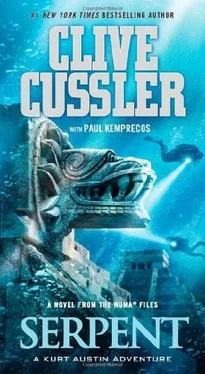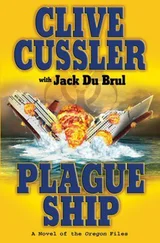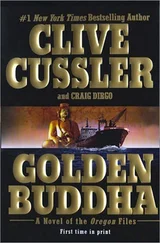An actual ship, for one thing. What we know about Phoenician ships we learned mainly from their pictures on coins. There have been some reports that they were as long as three hundred feet. I'd take that with a grain of salt, but even if you cut that length down by half you still have a substantial vessel for its day."
"Substantial enough to cross the Atlantic?"
"Without a doubt," she replied. "These vessels were a lot bigger and more seaworthy than some of the minuscule sailboats that have made the crossing. People have rowed across the ocean in a dory, for heaven sakes. This vessel would have been ideal. You can't beat the square sail for an ocean passage. With a fore-and-aft rig you've always got the possibility of a dangerous jibe, the boom swinging violently over with a shift of the wind. With the brails they could shorten sail in a brisk wind. They'd get a roll with that shallow keel, but the rowers could help keep her steady, and the length of the ship would help. A trireme like this could sail more than a hundred miles a day under ideal circumstances.
"Short of an actual ship, what would you need to convince you this is Phoenician?°
"I'm not talking about convincing me," Gamay said. "I'm already convinced. Could we go back to those fares again, Paul?" The six carved heads came up on the screen again. The laser dot touched on one depiction of the bearded man, then flicked to his twin. "The pointed hat on these gentlemen is consistent with those worn by Phoenician mariners."
"Which should come as no surprise," Orville interjected, "because the picture on the right came from a Phoenician stela discovered near Tunisia. The gentleman below him is identical to African-type faces found at La Venta, Mexico. The third physical type is from the Mayan ruins at Uxmal."
"I hear a conclusion lurking in there," Austin said.
Orville sat back in his chair and made a tent with his fingertips. "Basing conclusions on pictorial matching is fine if you're a pseudoscientist trying to sell a paperback book, but it's not good archaeology," Orville said. He took a deep breath. "My colleagues would drag what's left of my tattered reputation from one end of Harvard Yard to the other if they heard me say this. Marine
archaeology is not my forte, so I can't assess Nina's statements. What I do know is that the inscriptions on these rocks show Phoenicians, Africans, and Mayans together in one place. Furthermore, Dr. Chi and I have translated the glyphs together and independently, and we've come, up with the same results each time. The stones say that those ships arrived in Maya country after fleeing a disaster in their homeland. What's more, they were greeted not as strangers but as old acquaintances."
"Did the glyphs indicate a date?"
"Knowing the Maya's obsession with timekeeping, I'd be surprised if there weren't one. The ships arrived in what would be 146 B.C. in our calendar."
Nina stared at the projection and whispered in Latin.
Seeing all eyes turned in her direction she explained, "It's something you learn in first-year Latin. 'Delenda est Carthago.' Carthage must be destroyed! Cato the Elder ended every speech he made in the Roman senate with the phrase. He was trying to whip up public sentiment in favor of a war against the Phoenician city of Carthage."
"It worked, as I recall. Carthage was destroyed," Austin said.
"Yes. In 146 B.C."
"Which means these ships could have been escaping the Romans.
A date is a date," Nina said, digging in her heels before she got dragged too far into Austin's theory. "I simply pointed out the coincidence. I made no conclusion. As a scientist I'd be irresponsible to make a statement like that," she added, but she couldn't hide the excitement building in her gray eyes.
Austin said, "I understand why as scientists you can't come out and say what you're thinking without more solid evidence. But from what I've seen here today I'm convinced the inscriptions on these stones suggest that ancient voyagers arrived in America long before Columbus. You know the Phoenicians were capable of making the crossing.
"I know they were the world's greatest explorers up until the fifteenth or sixteenth century. They circumnavigated Africa and went as far as Cornwall on the English coast and Cape Verde. On one voyage they supposedly took thousands of people on sixty ships."
"I rest my case," Austin said with exaggerated smugness.
"Not so fast, Perry Mason. The doubters will say these inscriptions are interesting, but who's to say they are authentic? Years ago inscriptions in Brazil supposedly described a Phoenician expedition in 531 B.C. The consensus was that they were forged. It sounds crazy, but you'll get people saying the antiquities looters could have been carving this stuff to sell to gullible collectors. Sure, you could make a case that the 'ships of Tarshish' undertook transatlantic voyages, but you need more substantial and substantiated proof to get anyone in the scientific community to accept it."
"What about the astrolabe you and the professor found?"
"Even that wouldn't do it, Kurt. They would say someone with Cortez or a Spanish hidalgo brought this thing in, an Indian stole it and stuck it in an old temple. Close but no cigar until you know for sure how it got there."
"Did the writing indicate what the ships were carrying?"
"We've been saving that for last," Orville said, giggling like a schoolboy.
"Oh, yes. We brow what their cargo was," Chi said. "The Mayan writing says it was mainly copper, jewels, gold, and silver."
Austin looked like someone shaking off a head punch. "You're saying the ships were loaded with treasure?"
Chi nodded.
"This wasn't a routine trading expedition," Austin said, his green eyes flashing. "Carthage was under siege by the Romans. The Carthaginians would have done everything they could to make sure the Romans didn't get their hands on the royal treasury."
Any idea what happened to the treasure?" Zavala asked.
"Unfortunately none of the carvings goes beyond the one you saw of the safe arrival of the ships," Chi said.
Nina frowned. All this talk of treasure is exciting," she said with impatience, "but the dazzle of gold and jewels should not keep us from trying to find the answer to the question of why my expedition was massacred in Morocco."
"Nina's right," Austin said. "Let's concentrate on the thread that connects these inscriptions to the other discoveries overseas. Christopher Columbus. We know that hundreds of years after these stones were carved Columbus heard tales of a great treasure." He pointed at the screen. "Could this be what he was looking for?"
"I hate to throw cold water on your theory," Orville countered. "The rumors Columbus was following could have had their basis in the real riches held by the Aztecs. As we know the Spaniards hit the jackpot later:" He paused. "You say Columbus was sailing a definite course. Do I understand he was following a map?"
"Not exactly" Austin said. "You remember that news clip Nina asked you to dig out of your files?"
"Oh, yes, the article from my Fortean file about the stone artifact."
"Columbus mentioned that he was being guided by a 'talking stone.' "
"Now I remember. The carved monolith they found in Italy It was being shipped in an armored truck Headed right here to the Peabody, in fact."
Austin said, "That stone could be the key to this whole mess. Treasure and assassinations."
"What a shame we can't take a look at it."
"Who says we can't? NUMA has tackled deeper and more difficult projects."
"Let. me see if I follow your line of thinking," Orville said with disbelief. "You're planning on diving more than two hundred feet into a wrecked ocean liner in God knows what condition to retrieve a massive stone artifact from a locked armored car?"
Читать дальше












